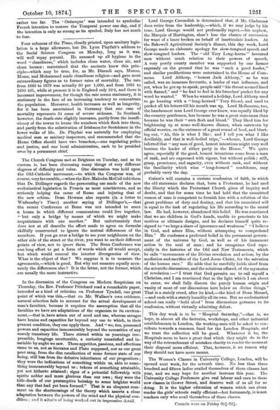In the discussion of the Congress on Modern Scepticism on
'Thursday, the Rev. Professor Pritchard read a remarkable paper, intended as a kind of criticism on Professor Tyndall, one great point of which was this,—that on Mr. Wallace's own evidence, natural selection fails to account for the actual development of man's faculties, because it requires the assumption that all the faculties we have are adaptations of the organism to its environ- ment,—that is, have arisen out of need and use, whereas savages have brains and capacities far beyond any use to which, in their present condition, they can apply them. And "we, too, possessed Towers and capacities immeasurably beyond the necessities of any merely transitory life. There stirred within -us yearnings irre- -pressible, longings unutterable, a curiosity unsatisfied and in- satiable by aught we saw. These appetites, passions, and affections oame to us, not as Socrates and Plato supposed, nor as our great poet sang, from the dim recollection of some former state of our being, still less from the delusive inheritance of our progenitors ; they were the indications of something within us, akin to some- thing immeasurably beyond us ; tokens of something attainable, yet not hitherto attained ; signs of a potential fellowship with spirits nobler and more glorious than our own ; they were the title-deeds of our presumptive heirship to some brighter world than any that had yet been formed." That is an eloquent com- ment on the shortcomings of the theory which asserts a close adaptation between the powers of the mind and the physical con- , dition ; and it admits of being worked out in impressive detail. I






































 Previous page
Previous page